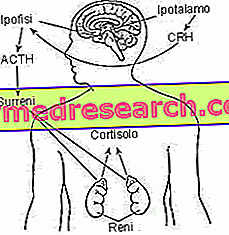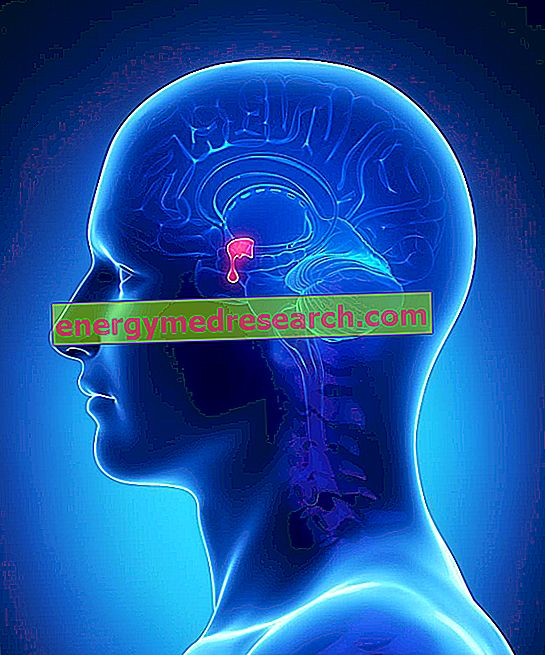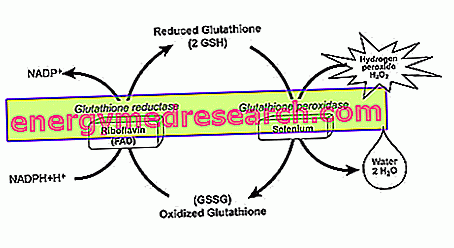Generality ACTH is a polypeptide hormone produced in the pituitary gland (pituitary gland). Its main function is to stimulate the secretion of other hormones, in particular glucocorticoids (including cortisol) by the adrenal glands (adrenal cortex). In turn, glucocorticoids influence the metabolism of sugars and the formation of androgens
Category endocrinology
Message sent by: Andrea Hi Elisabetta, cortisol has been renamed the "stress hormone" because its levels increase a lot due to psycho-physical stress. These stressful stimuli also include the strict diet and prolonged fasting, so it is very likely that the blood levels of cortisol and ACTH are increased simply because of the restrictive diet you underwent
Watch the video X Watch the video on youtube Is there a diet against hypothyroidism? The fundamental role of iodine in promoting correct thyroid function, and the great spread of the disorder, make many people with hypothyroidism wonder if there is an effective diet to treat this condition. For its part, official medicine responds that there is no standard diet against hypothyroidism , first of all due to the different origins of this disorder characterized by an insufficient synthesis of thyroid hormones
By Dr. Stefano Casali Endocrinology is the discipline that studies the complex system responsible for the transmission of chemical signals and the transfer of information between the different districts of the body, through which it evokes specific biological effects; it also deals with communication and control in a living organism by means of chemical mediators, called "messengers", hormones
Endocrinology is the branch of medicine that studies and treats diseases of the endocrine glands, that is, the organs responsible for the production and introduction into the blood of particular chemical messengers called hormones . Therefore, the endocrinologist is the doctor who deals with the diagnosis and treatment of imbalances and hormonal diseases
The acclimatization process - thanks to which the human body improves its thermodispersive effectiveness and efficiency over 7-10 days - also includes hormonal adaptations. These endocrine responses are intended to preserve body hydration, volume (circulating blood volume) and blood pressure, which are put to the test by sweating
Anorexia nervosa is a psychiatric condition that can induce severe forms of malnutrition / malnutrition. These, more or less serious, negatively affect the entire organism, compromising every type of tissue in the human body. Some examples of tissue damage are: alterations of muscles, hair, teeth, brain, etc
Iodine alone is not enough Speaking of the diet-thyroid relationship, the first thought is for iodine, a mineral essential for the functionality of this gland as a structural component of thyroid hormones. Thus, without iodine, the thyroid could not produce its own hormones. Another mineral that is particularly important for the metabolism of thyroid hormones is selenium, mainly known for its antioxidant function
Generality ACTH is a polypeptide hormone produced in the pituitary gland (pituitary gland). Its main function is to stimulate the secretion of other hormones, in particular glucocorticoids (including cortisol) by the adrenal glands (adrenal cortex). In turn, glucocorticoids influence the metabolism of sugars and the formation of androgens
What is it and when is it performed Thyroid aspiration is a minimally invasive diagnostic procedure, used when it is necessary to confirm or exclude the malignant nature of a thyroid nodule . Thyroid nodules - which are cellular clusters detectable on palpation and / or through diagnostic techniques such as ultrasonography and gland scintigraphy - are malignant in about 5% of cases
What is Andropause? Andropause is a term coined in recent times to indicate the natural depletion of male reproductive capacities in old age. This neologism recalls female menopause quite clearly, even if the suffix "pause" is badly suited to the decline of man's procreative abilities. The typical hormonal profile of an individual in andropause is established in a way that is anything but drastic, obvious or sudden, while in women menopause is a well-defined process, a mandatory step that begins with the disappearance of the menstrual cycle and is accompanied by a rapid drop in es









